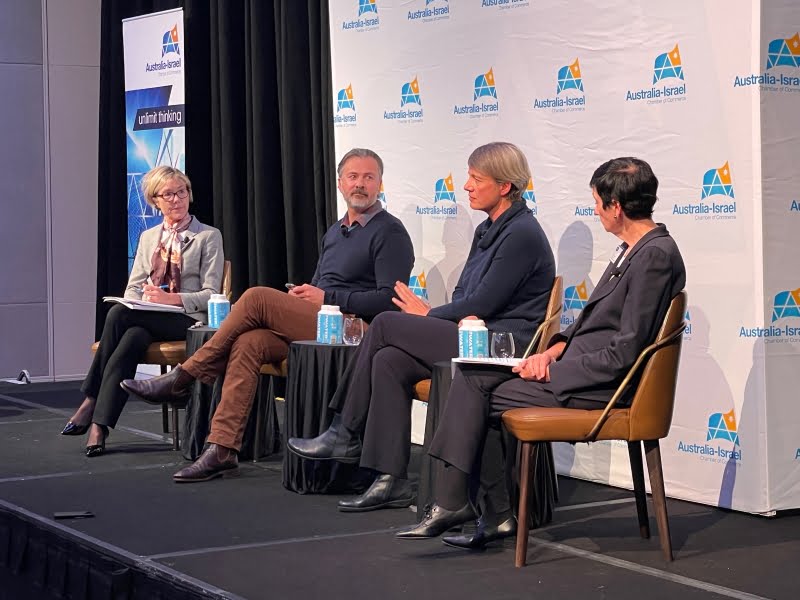Developing Australia’s “industries of tomorrow” like quantum computing requires long term, bipartisan public policy and a rethink of research outcomes, with the nation left vulnerable by policymakers, according to a number innovation and business leaders.
Australian governments have a renewed focus on sovereign capabilities like manufacturing because of the pandemic, including the Coalition’s Modern Manufacturing Initiative and the Opposition’s proposed $15 billion National Reconstruction Fund.
But more fundamental work is needed to research, develop and translate the technology that will work across sectors and be exported around the world, experts said at a panel event hosted by the Australia-Israel Chamber of Commerce in Sydney on Wednesday.

Quantum computing, for example, is the add-on almost all large organisations will soon need to get over what Professor Michelle Simmons said is the “brick wall” traditional computing systems will soon encounter.
Professor Simmons leads local firm Silicon Quantum Computing and was named Australian of the Year in 2018 for her work in quantum physics.
“More than ever we’re producing huge amounts of data, we need compute power, our problems being solved are very complex and classic computing is running into a problem,” Professor Simmons said.
“So there is going to be disruption with quantum coming along, and I think we’ve known that for the last 10 years. It’s been pretty obvious.”
Australia is poised to take advantage of that disruption, according to Professor Simmons, because of its world leading research and reputation in the field.
However, sovereign funding in quantum technologies is falling fast, according to recent analysis by ASPI, which warns Australia is quickly losing its edge and needs better policy settings.
What’s at stake is massive, according to Professor Simmons.
“In the future when this happens, it’s going to hit every industry,” she said.
“Any industry that relies on data is going to have to change to a paradigm where they start to use quantum computing. So it’s something that’s transformation and is happening around the world.”
Professor Simmons was speaking at the panel alongside Minderoo Wildlife and Disaster Resilience Program chief executive Adrian Turner and Business Council of Australia boss Jennifer Westacott.
Ms Westacott said new industries would only thrive if Australia could continue its wider growth and prosperity.
But the economic growth levels forecast in the budget would not be enough to drive better wages and living standards, she said, arguing Australia has been left “very vulnerable” by its non-complex economy and the concentration of big, incumbent business paying a quarter of Australia’s company tax.
“If iron ore prices were to just drop to their normal low on average today, that’s a $12 billion hit to the budget. And that means we’ve left ourselves very exposed,” Ms Westacott said.
Ms Westacott also pointed to the industry and research support programs of leading countries in Europe and Asia, which offer much more funding certainty and leadership stability relative to Australia.
“If we could just break through one thing in Australia it would be to stop changing these [innovation] programs every time you get a new industry minister, which we get more frequently than Prime Minsters,” she said.
“So it would be good to get some stability [like] one agency, one view.”
Adrian Turner, who previously led CSIRO’s Data61, called for a bipartisan, multi-decade plan that could also be adapted at any point to accommodate breakthroughs and emerging technologies.
The plan, he said, should be designed to drive the systematic change needed to create new industries.
Governments have a large role in that plan, Mr Turner said, including funding early-stage work, helping to establish a common language and methodology around innovation and research, and developing a national data strategy, which he suggested could be modelled on an expansion of the Consumer Data Right.
“If you think about the structural changes that that data strategy around banking and consumer data rights [and] think about the structural change for that whole sector – the financial services sector. So the implications are massive for this country to get the data part of this right,” Mr Turner said.
Do you know more? Contact James Riley via Email.


For starters, a policy focus on industrialisation rather than commercialisation would help! https://www.linkedin.com/pulse/industry-policy-industrialisation-imperatives-angus-m-robinson/